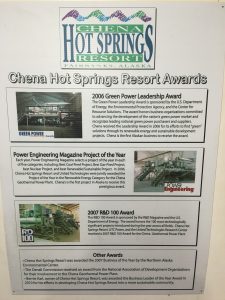22 July 2016, Day 9
Blog post by Stan Edwin, University of Alaska Fairbanks, USA
I found Chena Hot Springs very interesting, the first time I’ve actually been out here, and reluctant to come along on the tour. The tour showed us the renewable and recyclable energy strategy’s being tested and run as a viable part of the resort. As a physicist the simplicity behind the ideas is captivating, and as an indigenous Alaskan Gwich’in Indian, the idea of renewability and cleaner caught my attention.
The idea of reversing the organic chemistry of plastics by subjecting plastics to a slow constant heat and breaking the bonds is a great idea. This idea is doable if you do not have the idealisms of making fast money, or generating an abundance of energy, fuel, in the least amount of time. Another idea being investigated was from thermodynamics courses being taught in college, the workability of the sterling engine, with the idea of screw increaser.
In testing the viability of these ideas, which has always existed, Bernie Karl uses machines from eras long since gone. I can understand his logic, these machines where built when the principles behind them were new ideas, so the machines are the simplest possible utilizing these ideas. Today most machines have been made more complex by the drive towards efficiency.
When you are testing as a prototype a new principle or reusing in a new way old ideas and principles of physics that has been around for a while, keeping it simple is key. I am indeed impressed with what Bernie is doing out there, since he has the means, I wish him the best in his endeavors.
We all had fun; I know I did and am glad I attended.
Blog post by Yassine Dguidegue, Missouri University, USA
Our visit to Chena Hot Springs Resort, Alaska, provided us with challenging, yet informative, insights into how non-governmental institutions frame their conception and implementation of sustainable rural development. Our Journey with Burnie, one of the founders of the resort, was a journey into a peculiar world of policy framing and implementation that is locally based, community-oriented, and religiously guided. Burnie’s discourse, irrespective of its idiosyncrasy, is compelling to view the effectiveness of rural policies from a place-based and community-based perspective. From a place-based perspective, Chena Hot Springs showcases how Place-based resources shape rural development: from a gold mining site to a geothermal energy based resort, local natural resources of the area have shaped the area at the economic and socio-cultural level. From a community based perspective, Burnie emphasized the role of his religious teachings and parent’s legacy in shaping the courses of development Chena Hot Springs have taken. Thus, the resort epitomizes the complex, iterative, and multidimensional interaction between community based values and place-based resources. This interaction requires transdisciplinary approaches to grasp motives of its inception and its manifestations at the economic and socio-cultural level.
Blog post by DeQuarius King, Tuskegee University, USA
Today was an adventurous, yet informative excursion. We traveled 50 miles out of Fairbanks to the Chena Hot Springs Resort. Noticeably on the drive, distance to density was prevalent for the inhabitants along the county road. Upon arriving, Bernie Karl gave the best introduction of himself and his family traditions. “Nature has no waste,” was the theme of today’s adventure. He promised to make this statement reality throughout our stay on the resort. The perception of waste managers came off as harsh in the beginning, seeing as though Mr. Bernie has no filter. He addressed the fact that morals and legality may clash but morals are circumstances that must not be ignored. The plastic bottle oil conversion system was the first tale of truth. Grafting plant roots to increase yield on limited space plots was also a great tactic Bernie explained. Just about anything that was once trash can be utilized for a different purpose, from house siding to ashes converted to cement. A valid point was made about the American population being 5% of the world’s population but consumes 30% of the world energy. Something to ponder upon…The horticultural truth gives young agronomist an insight on the wisdom Mother Nature holds. Bernie gave vivid explanations on how controlled environments produce more efficiently. I definitely left Chena Hot Springs with a different perception of what we call waste. We must innovate and recreate. I’d like to thank Mr. Bernie again for the jewels and the ICRPS family for this ultimate experience!
Blog post by Nadinne Gonzalez Romero, Universidad Autónoma del Estado de México, México
In our world, plagued with climate change, there is a need for innovation and creativity to solve our problems that threaten our livelihood systems. Since energy has been very crucial for development at the global level, we need to think of alternatives to non-renewable energies which have become detrimental to our life and the environment. Chena Hot Springs exemplifies the adoption of innovative alternative energy which is inspired by nature. Bernie kept reiterating that he is showing “how nature can work with you and that you should work with that”. His work with nature is built on two principles, first his respect for “mother nature”, and second his perseverance which has no limits. As a researcher in tourism studies, I deem these two principles as essential to attain sustainable tourism. Chena Hot Springs is a model to learn from because it pays attention to the tenets of sustainable development: environmental protection, economic viability, and social equity.


